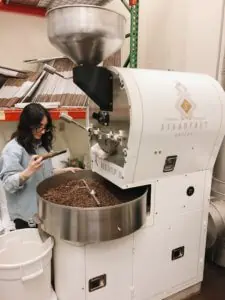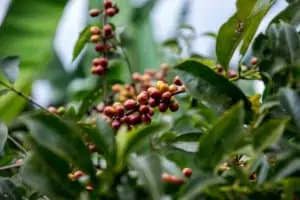Every year in November, we put out a call for special coffees that roasters around the world are featuring for the holidays. It’s always a surprise and a delight to discover what surfaces during this weeks-long cupping. And what we learn never fails to be compelling in multi-faceted ways.
Some roasters approach seasonal offerings by composing creative, often unique, blends, while others prefer to go the route of rare or high-end “splurge” coffees that gift recipients might not buy for themselves. And then there are those roasters who focus on exceptional examples of familiar single-origin coffees whose window of seasonal availability happens to be right about now.
For this year’s holiday report, we received an abundance of coffees in each category. We review the top 10 here, ranging in score from 92-96. Spoiler alert: several are bargains, given their distinction and quality.
Rare and Expensive Holiday Coffees
Let’s start at the top, both in terms of rating and value. For the coffee-lover who has brewed everything, consider the 96-point Gesha (also spelled Geisha) from Bar Nine. With deep, yet soaring, fruit, chocolate and rum notes, this natural-processed version of the celebrated Gesha variety is also a bargain, at $30 for 250 grams (approximately eight ounces). Bar Nine co-owner Zayde Naquib says this coffee was processed using producer Ninety Plus‘ “hot fermentation” method, a proprietary (i.e., secret) recipe that is designed to bring out a more distinct perfumed quality to the aromatics and a deeper cup profile. He adds that, “The fermentation recipe is actually the same as used for Perci, one of the more well-known coffees released by Ninety Plus. Because of the larger scale with the Baru, we are able to share this incredible coffee at much more affordable prices than most Geshas.”

Los Angeles roaster Bar Nine’s Baru Gesha. Courtesy of Bar Nine.
Right on its heels, at 95, is Taiwan-based Ho Soo Tsai’s Flowery Nekisse. The Nekisse is a brand of Ethiopia green coffee also developed by Ninety Plus, which has operations in both Panama and Ethiopia. Roaster Jeff Chang gives this coffee a special treatment prior to roasting: sous vide. Typically found in esoteric cookbooks and molecular gastronomy restaurants, this procedure adapted for coffee involves vacuum-sealing the green beans in a plastic bag, then soaking them in a warm-water bath for three to four hours. Chang says, “The sous vide technique helps roasters avoid flavors of under-development in light-roast coffees, such as undesirable green, stemmy, grassy or overly savory notes.”
Returning to Gesha, we offer an interesting opportunity to sample two Geshas from the same farm, one processed by the wet, or washed, method, and the other processed by the dried-in-the-fruit or natural method. The producer is Roberto Brenes of Panama’s Finca La Aurora. The washed version is roasted by San Diego’s Bird Rock Coffee Roasters (94) and the natural by Willoughby’s Coffee & Tea in Branford, Connecticut (93). The former is crisply floral and sweetly herbaceous, while the latter is cleanly fruit-toned with a pleasing shimmer of sweet ferment.
Hillsborough, North Carolina’s Joe Van Gogh Coffee sent us a splendid Gesha from Colombia, the El Obraje (94), certainly as impressive as its Panama counterparts: spicy and multi-faceted, displaying notes as diverse as bergamot and vanilla.
Seasonal, Familiar and Exceptional
Along with the Geshas and special microlots, two more familiar single-origin coffee types made it to this month’s reviews, both at 92. The Speckled Ax Pacamara was grown in El Salvador and leads with notes of peach and grapefruit zest. Pacamara is a “big-beaned” hybrid of the Bourbon-related Pacas and the huge-beaned Maragogipe, itself a mutant of the ancient Typica variety. This version adds to its fruit a hint of the appealing savory character this variety is known for. Roaster Matt Bolinder cupped this coffee at Café Imports’ Best Cup competition and auction, and he says he likes it because “it’s very fruity for a washed coffee, yet the fruit profile doesn’t taste completely process-driven, or like something that’s been overly fermented.”

Katelynn Hunter behind the roaster at Steadfast Roasting in Nashville, Tennessee. Courtesy of Steadfast Roasting.
Steadfast Roasting, based in Nashville, Tennessee, is new to Coffee Review, and we enjoyed head roaster Katelynn Hunter’s washed Guji Oraga Tabe Ethiopia. Hunter chose this coffee for its uniqueness. She says, “It’s crazy-floral, but also has great acidity and a gingerbread sweetness as it cools. I think this is the perfect coffee to gift the coffee nerds on your list.”
Holiday Blends Worth a Detour
Blends of any kind are, by nature, an experiment, even in contexts where the variables are well known. For example, Bordeaux enologists work, day in and day out, with Cabernet Sauvignon and Merlot grapes, but each year’s blend is different, based on weather, Brix at harvest, fermentation style, and other factors. Coffee roasters are not as limited as many winemakers are in terms of the blends they can create, given that they are not constrained by legal definitions founded on geography or region. Roasters may sometimes create blends designed to absorb whatever faded green coffees they have left at year’s end, for example. Gratifyingly, the three blends that we rated highest this month appear to be the polar opposite of that expedient scenario. They are composed of green coffees carefully selected for their individuality, then tested in various proportions aimed at realizing the roaster’s vision for the blend.
Top-rated at 94 in the blends category is Red Rooster Coffee’s Holiday Sweet Blend, a striking combination of a natural-processed Ethiopia from the WORKA cooperative, a washed Ethiopia Banko, a washed Rwanda COOPAC, and a washed Colombia Tolima. It’s organic and fair-trade certified, as well as a bargain at $16.99 for 12 ounces. Head roaster Tony Greatorex’s aim was to create something special beyond the company’s standard year-round offerings. He says, “I’ve settled into laying the foundation for the Holiday Sweet [each year] with washed and natural Ethiopias pushed to the foreground. They’re consistently my favorite coffees, and we’ve created a following for them with our customer base. I’m increasingly interested in providing balance to exciting sweet, floral and fruit-forward coffees, so I rounded out the profile with a mildly spicy washed Rwanda from the reliable COOPAC co-op, and a nice lower-toned washed Colombia from La Cumbre, Tolima.”
Olympia Coffee’ReHoliday Blend (93) celebrates Ethiopia, the birthplace of Arabica coffee, and the advances made in Olympia’s sourcing work there during 2018. Owner and roastmaster Oliver Stormshak sourced two coffees from independent farmers in Yirgacheffe—a natural from Adisu Kidane and a washed from Desta Gola. Traditionally, coffee in Ethiopia is grown by smallholding producers who work within the cooperative system to export their coffee. Stormshak says, “Over the last two years, we have worked to identify producers who have the quality and quantity of coffee needed to separate from their cooperatives and, in turn, earn more for themselves and their families. We incentivize these producers’ independence by purchasing from them directly at our “Fair For All” prices, allowing them to retain 30% more than what they would have earned from their cooperative. This enables them to become their own owner, operator, and exporter. This level of transparency and independence is new to Ethiopian coffee, and we are excited to showcase its merits and celebrate it with our customers this holiday season.”

Coffee cherries growing in the Yirgacheffe growing region of Ethiopia on Adisu Kidane’s farm. Courtesy of Bedhatu Jibicho.
“Kith and kin” is an old-fashioned term for friends and family, a good recipe for successful holiday gatherings. Revel Coffee’s Kith & Kin Blend (93), heavy on Kenya with an assist from washed Ethiopia, nets what owner and roaster Gary Theisen was going for with this season’s holiday blend: a coffee experience both powerful and approachable. At $17.50 for 12 ounces, it’s also a slam-dunk stocking stuffer.
Cheers to all! Here’s to a peaceful holiday season and a new year full of promise—and coffee, always coffee.










